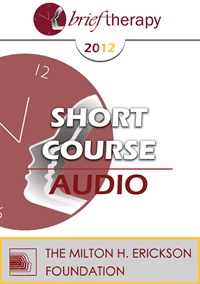
- Average Rating:
- Not yet rated
- Topic Areas:
- Short Courses | Single-Session | Therapist Development
- Categories:
- Brief Therapy Conference | Brief Therapy Conference 2012
- Faculty:
- Arnold Slive, PhD
- Duration:
- 1:18:23
- Format:
- Audio Only
- Original Program Date:
- Dec 09, 2012
- Short Description:
- Walk-in counseling services allow clients to attend a session of therapy without waiting for an appointment. Many are seen for only one session. Research consistently indicates that “one” is the modal number of sessions for all models of therapy and that single sessions are highly effective. This workshop describes therapy, research, strategies, and techniques for making single sessions, whether planned or not, as effective as possible. Emphasis will be on the application of these principles in a variety of walk-in services.
- Price:
- $15.00 - Base Price
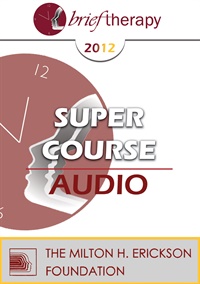
- Average Rating:
- Not yet rated
- Topic Areas:
- Depression | Hypnosis | Super Courses | Experiential Therapy | Mindfulness | Brief Therapy
- Categories:
- Brief Therapy Conference | Brief Therapy Conference 2012
- Faculty:
- Michael Yapko, PhD
- Duration:
- 4:42:27
- Format:
- Audio Only
- Original Program Date:
- Dec 09, 2012
- Short Description:
- The cutting edge of rapidly expanding scientific evidence highlights that the more we learn about the biology of depression, the more important psychology and social experiences become in shaping recovery on all levels. Participants will learn to utilize therapy as a social process that can teach clients skills experientially in order to reduce and even prevent depression. Interventions involving skill building homework assignments, and experiential methods of hypnosis and mindfulness will be considered in depth through group hypnosis and at least one skill-building exercise.
- Price:
- $15.00 - Base Price
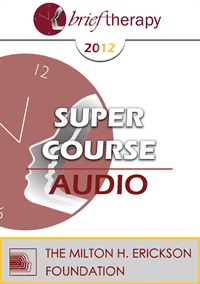
- Average Rating:
- Not yet rated
- Topic Areas:
- Attachment | Neuroscience | Super Courses | Intimacy | Differentiation
- Categories:
- Brief Therapy Conference | Brief Therapy Conference 2012
- Faculty:
- Ellyn Bader, PhD
- Duration:
- 1:51:57
- Format:
- Audio Only
- Original Program Date:
- Dec 09, 2012
- Short Description:
- BT12 Super Course 02 – Passion, Vitality and Intimacy: Integrating Attachment, Differentiation and Neuroscience – Ellyn Bader, PhD Many partners crave intimacy or demand it, yet they fear the involvement that makes intimacy possible. Learn to use attachment theory, differentiation theory and neuroscience principles to lead your couples out of pain. Create sustained change with challenging issues such as infidelity, ongoing hostility, narcissism and pervasive conflict avoidance. Videotapes and clinical case examples will be used throughout the workshop.
- Price:
- $15.00 - Base Price
Tags: Differentiation
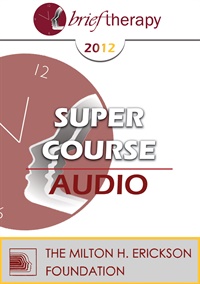
- Average Rating:
- Not yet rated
- Topic Areas:
- Psychotherapy | Super Courses | Tailoring | Mindfulness
- Categories:
- Brief Therapy Conference | Brief Therapy Conference 2012
- Faculty:
- Ronald Siegel, PsyD
- Duration:
- 4:40:35
- Format:
- Audio Only
- Original Program Date:
- Dec 09, 2012
- Short Description:
- BT12 Super Course 03 – Harnessing Mindfulness: Tailoring the Practice to the Problem – Ronald Siegel, PsyD Mindfulness-based psychotherapy is the most popular new treatment approach in the last decade—and for good reason. Mindfulness practices hold great promise both for our own personal development and as remarkably powerful tools to augment virtually every form of psychotherapy. Mindfulness is not, however, a one-size-fits-all remedy. In this workshop you’ll learn how mindfulness practices work to alleviate psychological distress, and how to creatively tailor them to meet the needs of diverse people and conditions. We’ll examine how to use mindfulness practices to help resolve disorders such as anxiety, depression, and stress-related medical problems, while enriching and enlivening therapeutic work.
- Price:
- $15.00 - Base Price
Tags: Mindfulness
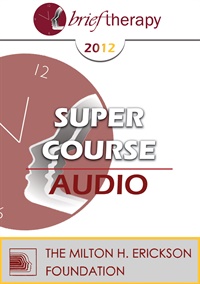
- Average Rating:
- Not yet rated
- Topic Areas:
- Trauma | Super Courses | Pain and Healing
- Categories:
- Brief Therapy Conference | Brief Therapy Conference 2012
- Faculty:
- Peter Levine, PhD | Maggie Phillips, PhD
- Duration:
- 3:56:47
- Format:
- Audio Only
- Original Program Date:
- Dec 09, 2012
- Short Description:
- BT12 Super Course 04 – Finding Freedom from Pain: Solving the Complex Puzzle of Trauma and Pain – Peter Levine, PhD, & Maggie Phillips, PhD The incidence of persistent and chronic pain conditions have become a public health crisis with more people suffering from chronic pain than from diabetes, cancer, and heart disease combined. The cost of suffering (human and financial) is huge and in part results from the fact that pain is so complex—ranging far beyond the intersection of neural transmission and sensory experience. The puzzle of pain involves a complicated labyrinth of emotions, sensations, culture, individual experience, genetics, spiritual meaning, as well as habitual physiological reactions. This workshop presents both the art and science of working with the resources of the body to reverse the effects of physical, emotional, and trauma related pain.
- Price:
- $15.00 - Base Price
Tags: Pain & Healing
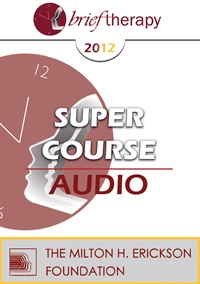
- Average Rating:
- Not yet rated
- Topic Areas:
- Meditation, Spirituality and Yoga | Super Courses
- Categories:
- Brief Therapy Conference | Brief Therapy Conference 2012
- Faculty:
- Kathryn Rossi, PhD
- Duration:
- 2:25:06
- Format:
- Audio Only
- Original Program Date:
- Dec 09, 2012
- Short Description:
- BT12 Super Course 05 – Mythic Yoga: Creative Transformations Through Body and Mind – Kathryn Rossi, PhD Is personal enlightenment really possible? Can we creatively experience our own transformational stories via yoga? We propose Erickson’s naturalistic–utilization therapy and Rossi’s 4-stage creative process are consistent with yoga’s ancient science of self-inquiry, mental dexterity and Buddha’s Four Noble truths. In this workshop we will have an opportunity to experience the stories of ancient yoga and self-transformation as presented in our new book, Creating Consciousness: How Therapists can Facilitate Wonder, Wisdom, Beauty, & Truth. We will practice gentle hatha yoga for all fitness levels and volunteers will share their current life transitions. Please bring your yoga mat if you have one.
- Price:
- $15.00 - Base Price
Tags: Mind-Body
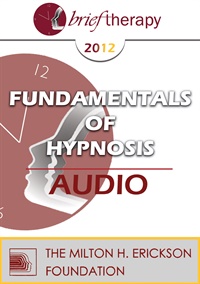
- Average Rating:
- Not yet rated
- Topic Areas:
- Hypnosis | Fundamentals of Hypnosis | Workshops | Hypnotic Phenomena
- Categories:
- Brief Therapy Conference | Brief Therapy Conference 2012
- Faculty:
- Brent Geary, PhD
- Duration:
- 2:06:54
- Format:
- Audio Only
- Original Program Date:
- Dec 08, 2012
- Short Description:
- The utilization of hypnosis always involves the hypnotic phenomena. This session will explore the various phenomena and their role in clinical contexts. Participants will practice elicitation of hypnotic phenomena.
- Price:
- $15.00 - Base Price
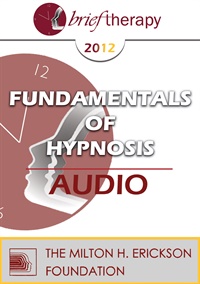
- Average Rating:
- Not yet rated
- Topic Areas:
- Hypnosis | Fundamentals of Hypnosis | Workshops | Indirection
- Categories:
- Brief Therapy Conference | Brief Therapy Conference 2012
- Faculty:
- Brent Geary, PhD
- Duration:
- 1:54:19
- Format:
- Audio Only
- Original Program Date:
- Dec 08, 2012
- Short Description:
- One of Erickson’s landmark contributions to hypnosis was his introduction of indirection as a therapeutic approach. This final section of the training explores the ways in which anecdotes, metaphors, and other indirect methods can be utilized.
- Price:
- $15.00 - Base Price

- Average Rating:
- Not yet rated
- Topic Areas:
- Keynotes | Addiction
- Categories:
- Brief Therapy Conference | Brief Therapy Conference 2012
- Faculty:
- Patrick Carnes, PhD, CAS
- Course Levels:
- Master Degree or Higher in Health-Related Field
- Duration:
- 1:07:07
- Format:
- Audio and Video
- Original Program Date:
- Dec 08, 2012
- Short Description:
- BT12 Keynote 04 – Bargains with Chaos: Challenges and Choices – Patrick Carnes, PhD, CAS We witness a continuous parade of stars, financial gurus, clergy, politicians and athletes who enter rehabs sometimes repetitively. Is this about media coverage or are these elite canaries in the coal mines of our culture signifying a greater danger? Our understanding of addictions with the aid of neuroscience is expanding dramatically. With it is the realization of cultural and scientific shifts which underline the therapist’s role in facing our number one public health problem. One of the gifts of this challenge is our growth in technology which will transform what every therapist does for a living and maybe how humans evolve. But maybe we professionals are like the famous—reluctant to face difficult realities.
- Price:
- $29.00 - Base Price
Tags: Addiction Neuroscience
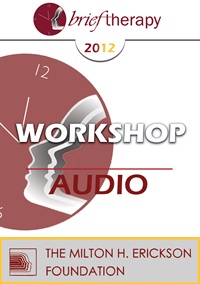
- Average Rating:
- Not yet rated
- Topic Areas:
- Trauma | Workshops | Multicultural
- Categories:
- Brief Therapy Conference | Brief Therapy Conference 2012
- Faculty:
- Kenneth Hardy, PhD
- Duration:
- 2:59:14
- Format:
- Audio Only
- Original Program Date:
- Dec 08, 2012
- Short Description:
- BT12 Workshop 23 – Understanding & Treating the Invisible Wounds of Socio-Cultural Trauma – Kenneth Hardy, PhD This workshop will provide a Socio-cultural view of trauma, highlighting the dynamics of the intersection of oppression and trauma. Strategies for effectively engaging and treating individuals and families with ‘oppression trauma’ will be discussed. Relevant Self of the Therapist issues will be explored.
- Price:
- $15.00 - Base Price
Tags: Multi-Cultural Trauma
Please wait ...

